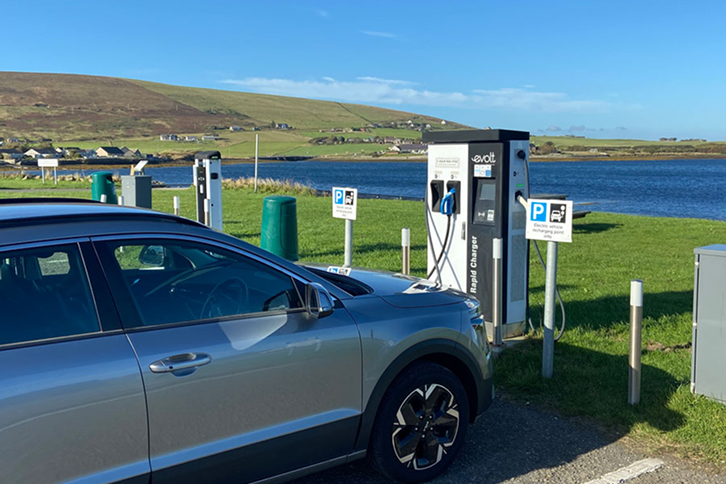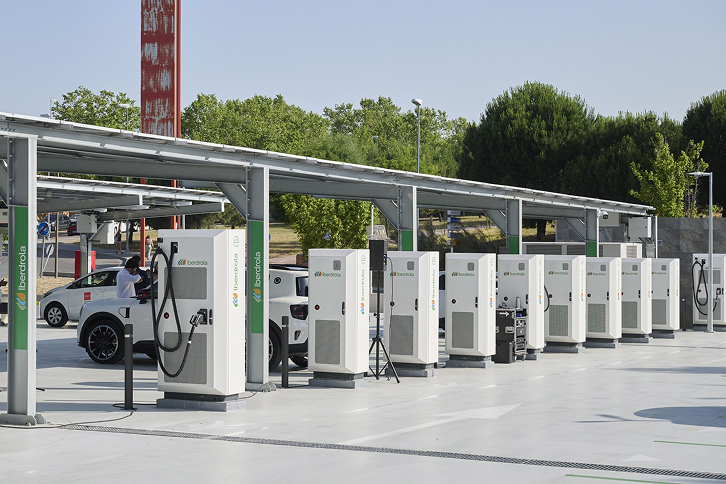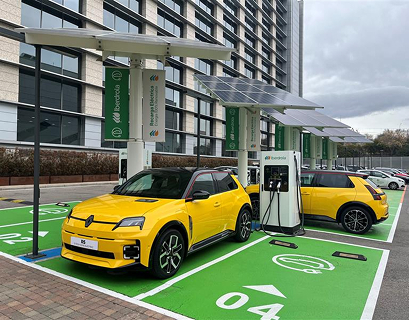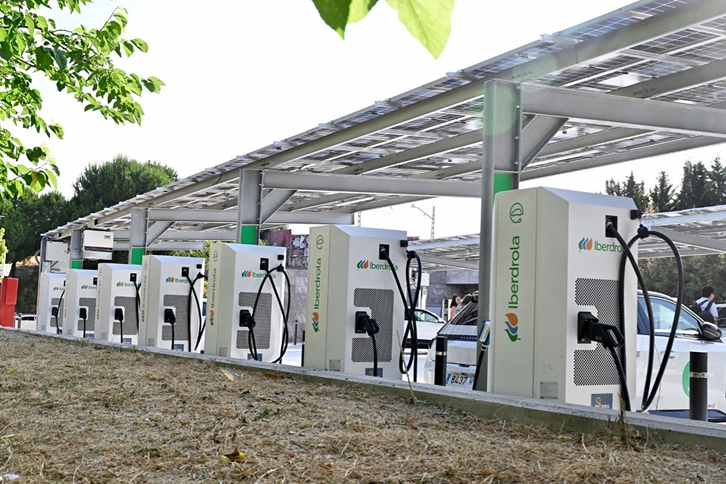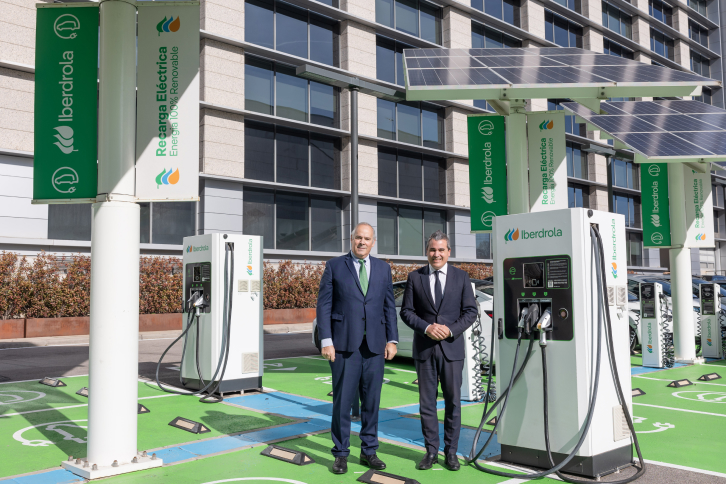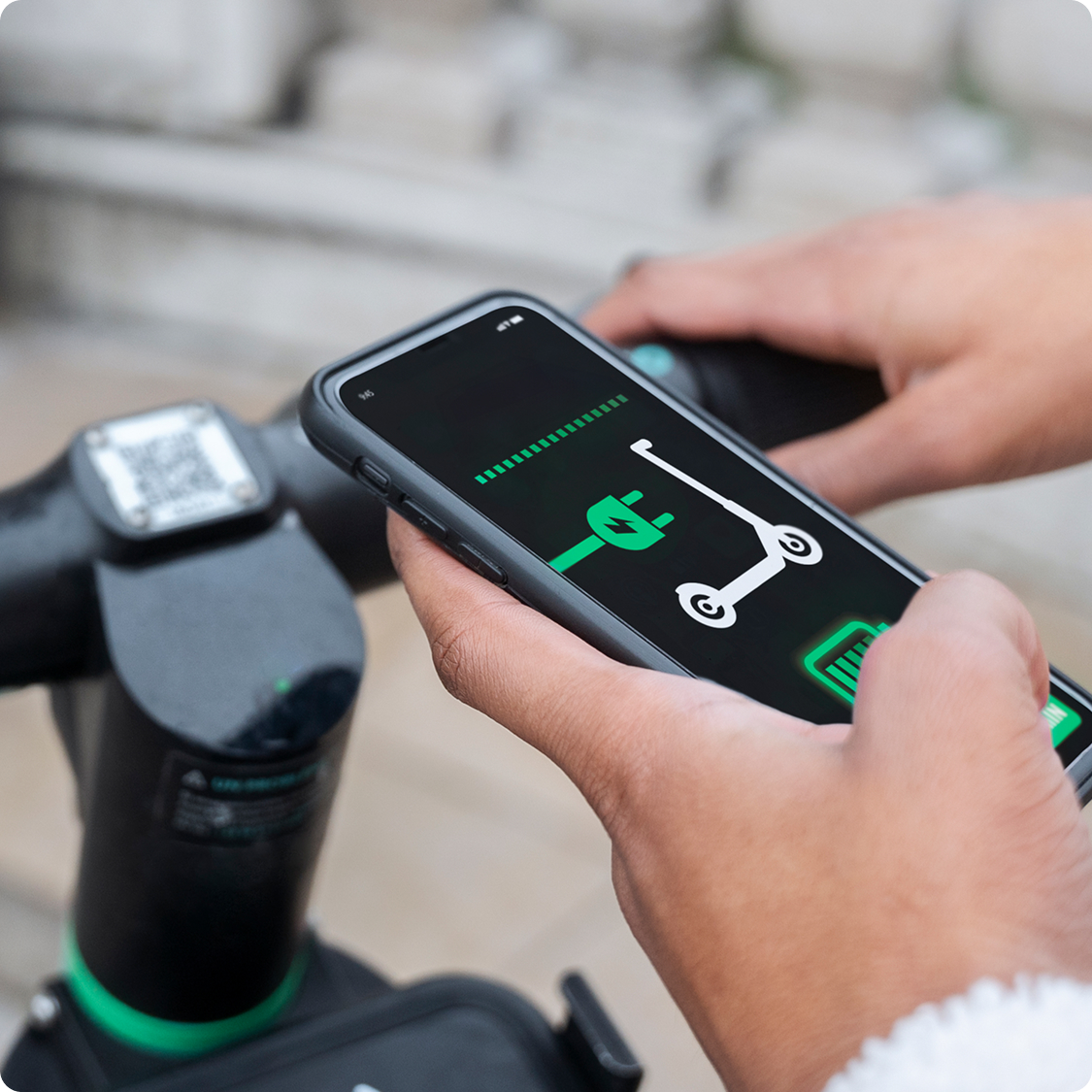
Sustainable mobility
Sustainable mobility: what it is, its goals and the main initiatives at Iberdrola
Sustainable mobility has become one of the main drivers in the fight against climate change and improving the quality of life in cities. At Iberdrola, we are committed to leading this transformation by promoting innovative and sustainable solutions that integrate renewable energy and smart grids, as well as the electrification of transport. Our goal is to promote a respectful mobility model in line with our decarbonisation and sustainability strategy.
Sustainable mobility has become a fundamental pillar of the energy transition and a necessary alternative to find a new way of getting around. According to the International Energy Agency (IEA), road transport is currently responsible for approximately a quarter of all greenhouse gas emissions worldwide.
With the push from international targets to mitigate climate change, however, new opportunities are opening up to drastically minimise dependence on fossil fuels and move towards a cleaner and more efficient energy model. This change not only contributes to mitigating climate change, but also improves air quality in our cities, reducing the impact of pollution on people's health.
Electric mobility plays a central role in this by enabling more sustainable transport that uses emissions-free energy sources. In addition, initiatives such as the development of charging infrastructure and the integration of smart technologies are essential to realising an efficient and accessible mobility ecosystem. This transformation is a global challenge that requires governments, businesses and people to work together to achieve climate goals and build a more environmentally friendly future.
What are the goals of sustainable mobility?
Sustainable mobility is not only about changing the way we travel, it’s also about completely transforming the transport system to make it more efficient, accessible and environmentally friendly. Its objectives are aligned with major global challenges, such as combating climate change, improving air quality and building more liveable and accessible cities. These principles guide policies and actions towards a transport model that prioritises people, equality and sustainability.
Opportunities for sustainable mobility
Sustainable mobility is not just an alternative solution to environmental and climate challenges, it also opens the door to a range of economic, social and technological opportunities that can make our society better.
Types of sustainable mobility
Sustainable mobility encompasses a variety of environmentally-friendly alternatives. Each offers specific characteristics for different needs and contexts, so that each individual can find the best form of mobility for each moment. In general, the main types of sustainable mobility can be divided into two broad groups depending on whether they involve the use of an engine for travel or not.

We are energy in motion.
Iberdrola's main sustainable mobility initiatives
We have various projects to promote sustainable mobility in several countries, focusing on reducing emissions and pushing for the electrification of transport.
Spain
At Iberdrola, we have developed a robust programme to deploy sustainable transport in Spain: our Smart Mobility Plan External link, opens in new window. . This comprehensive programme includes several key actions to facilitate the adoption of electric vehicles and reduce the environmental impact of the sector:
External link, opens in new window. . This comprehensive programme includes several key actions to facilitate the adoption of electric vehicles and reduce the environmental impact of the sector:
- Deployment of public charging infrastructure. We are committed to installing an extensive network of charging points or electric vehicle charging stations, with more than 8,000 points already set up across the country. We have also partnered with BP Pulse, a subsidiary of the British BP, to create the most extensive high-speed public charging network in the Iberian Peninsula, with plans to deploy more than 10,000 points by 2030.
- Development of the private charging network. We offer private solutions for both domestic (Smart Mobility) and business (Smart Mobility Empresa) use. This involves the installation of the charging infrastructure and its warranty, personalised supply plans and the possibility of remote, real-time operation via app. Our public and private network has over 60,000 charging points.
- Electrification of company car parks. We install the necessary infrastructure to adapt company car parks to electric solutions.
- Electrification of public and heavy transport. We provide solutions for electrifying public vehicles such as city buses. We continue to promote charging infrastructure with initiatives in Madrid, Barcelona, Valencia and Elche, among other cities. In addition, we are committed to helping electrify heavy road transport through partnerships with the Business Association for the Development and Promotion of Electric Mobility (AEDIVE), Disfrimur and Ingeteam, and a specific hub in Elche.
- Other strategic partners. We continue to sign agreements with key companies in the transport sector, such as major vehicle manufacturers (e.g. Renault, Mercedes Benz, Volvo, KIA, Hyundai, etc.) and various power purchase agreements (PPAs) with different businesses (Mercadona, Eroski, Burger King, McDonalds and Alcampo, among others).
In Spain, we have also created, together with Transportes Metropolitanos de Barcelona (TMB), the country's first public and commercial hydrogen refuelling station, in Barcelona's Zona Franca. This facility began operating in January 2022 and supplies green hydrogen to TMB buses and other electric vehicle fleets.
The United Kingdom
Through our subsidiary ScottishPower in the United Kingdom we are advancing electrification in the domestic External link, opens in new window. and business
External link, opens in new window. and business External link, opens in new window. spheres. For residential use, we offer electric vehicle chargers with installation, warranty, solar energy compatibility and after-sales service. For corporate use, we provide companies with fast and ultra-fast chargers, with customised installation adapted to safety regulations. We also have initiatives for corporate fleets.
External link, opens in new window. spheres. For residential use, we offer electric vehicle chargers with installation, warranty, solar energy compatibility and after-sales service. For corporate use, we provide companies with fast and ultra-fast chargers, with customised installation adapted to safety regulations. We also have initiatives for corporate fleets.
Portugal
In Portugal, we offer a range of solutions External link, opens in new window. for electric mobility. In residential, we offer the installation of private chargers with electricity plans tailored to our customers' needs. We are also committed to electrifying public and heavy transport. Our partnerships with major vehicle manufacturers and companies such as Mercadona, for whom we supply, commission and already operate more than 3,500 points in 800 supermarkets in Spain and Portugal, are particularly noteworthy
External link, opens in new window. for electric mobility. In residential, we offer the installation of private chargers with electricity plans tailored to our customers' needs. We are also committed to electrifying public and heavy transport. Our partnerships with major vehicle manufacturers and companies such as Mercadona, for whom we supply, commission and already operate more than 3,500 points in 800 supermarkets in Spain and Portugal, are particularly noteworthy
Australia
Through Iberdrola Australia, we offer a range of electric mobility solutions as part of our sustainable energy strategy External link, opens in new window. . These include installing and managing charging infrastructure for electric vehicles, combined with solar generation and battery storage. We have also implemented charging stations in projects such as solar car parks, improving accessibility to electromobility.
External link, opens in new window. . These include installing and managing charging infrastructure for electric vehicles, combined with solar generation and battery storage. We have also implemented charging stations in projects such as solar car parks, improving accessibility to electromobility.
The future of sustainable mobility
Projections indicate that sustainable mobility will continue to expand in the coming years. A study by the Oliver Wyman Forum and the University of California, Berkeley Transportation Institute Enlace externo, se abre en ventana nueva. estimates that by 2030, cities will be made up of a range of on-demand, shared and electric urban transport services that will generate a turnover of $660B worldwide, up from $260B in 2020.
Enlace externo, se abre en ventana nueva. estimates that by 2030, cities will be made up of a range of on-demand, shared and electric urban transport services that will generate a turnover of $660B worldwide, up from $260B in 2020.
Consumer acceptance and support are also taking off. PwC's Voice of the Consumer 2024 Enlace externo, se abre en ventana nueva. survey reveals that most respondents globally want less traffic, environmentally-friendly vehicles and better public transport. These are decisions that are significantly influenced by concerns about climate change, the study notes.
Enlace externo, se abre en ventana nueva. survey reveals that most respondents globally want less traffic, environmentally-friendly vehicles and better public transport. These are decisions that are significantly influenced by concerns about climate change, the study notes.
The future of alternative mobility is therefore shaping up to be a combination of technological innovation, public policies that encourage its use and deployment, and changes in user habits to reduce environmental impact and improve quality of life in cities and on roads.
Urban mobility trends
Many of the trends in sustainable mobility are focused on cities, the main hubs of citizen movement. These are some of the key trends:
All the information about
Sustainable mobility
What is sustainable mobility? What is its objective?
The concept of sustainable mobility refers to that which satisfies the needs of moving freely, being able to establish relationships without sacrificing ecological and human values (current or future). It seeks to improve the quality of the environment, not only on the basis of reducing harmful emissions from transport, but also to protect pedestrians, cyclists and people with reduced mobility. It also provides universal access to key places through public transport and internalises the socio-economic costs of means of transport.
What is sustainable mobility?
Sustainable mobility arises to counteract the negative effects caused by a type of transport model that pollutes the air, consumes excessive energy and damages the health of citizens.
It is an energy and environmental challenge that will contribute to improving social, economic and also transport well-being in cities.
It is a question of being transported in the most environmentally friendly way possible; leaving aside fossil fuels (responsible for the largest discharge of CO2 into the atmosphere and responsible for 4.5 million deaths a year, according to the latest reports). In order to combine mobility and sustainability it is necessary to invest in electric cars, carsharing and public transport. For this to be possible, mobility policies in pro of the environment are needed, as well as the implementation of a mobility plan that supports the green fleet, restrictions on polluting vehicles in urban areas and the construction of roads and circuits for non-motorised vehicles.
What sustainable mobility plan does Iberdrola propose?
Iberdrola wants to lead the transition towards sustainable mobility and electrification in transport. To this end, it offers different advantages to its stakeholders, through the Iberdrola Sustainable Mobility Plan. As part of its Policy on Management and Protection of Nature, this strategic mobility plan carries out more than 20 actions to promote the use of clean energy and end carbon emissions of traditional vehicles that run on fossil fuels. Among its actions are those aimed at its employees: aid to acquire an electric vehicle, offer of collective transport, carpooling and promotion of the use of bicycles, among others. Likewise, its business activity includes green fleet; electricity recharging points in workplaces; Operations Mobility Service and carsharing service, among others. The plan also offers numerous advantages for its customers and suppliers: the electronic invoice service, which avoids expenses on paper and ink, and cancels the emissions derived from travelling to deliver the invoices. And the CO2 calculator, designed to control the latter. In addition, Iberdrola is launching the Smart Mobility Plan for its customers, which is committed to electric mobility (it includes special rates and the largest network of fast charging stations for electric vehicles on Spain's main motorways).
What is Iberdrola's electric mobility plan?
Iberdrola is committed to electric mobility through its Smart Mobility Plan, which offers alternative mobility and provides the latest in electric car recharging.
Travelling across Spain from end to end with an electric car is already a reality thanks to the fast-charging solutions offered by this plan for electric vehicles. The Smart Mobility Plan includes the installation of charging points and a special tariff for charging vehicles with 100% green electricity. As of September 2025, Iberdrola and its Joint Venture already operate 10,000 public charging points in the country, and the total roll-out is expected to reach 200,000 charging points by 2030, including residential, corporate and public ones. The plan is aimed at all households and businesses committed to sustainable mobility and wishing to offer this service to their employees and customers.
Users can recharge, whether they are Iberdrola customers or not, using the mobile application that the company has developed, through the Iberdrola Public Recharge app. Drivers will be able to geolocate, book and pay for their recharges via mobile phone. The application has a verified map of all the chargers on public roads in Spain — there are currently more than 3,600 charging points operated by Iberdrola and other energy companies in 1,200 locations —.
Where is electrical mobility today?
Automotive experts seem to agree that the sector will evolve more in the next five years than it has in the last half century. Increasingly, governments are providing incentives for electric cars (Plan Moves in Spain, for example); and restrictions on polluting vehicles in urban areas are forcing the advent of electric transport without conditions. Sales of pure electric cars continue to rise, taking into account new European CO2 emission measures: the number of electric transport registrations will have to be increased as this is the only option for not exceeding the permitted CO2 emissions which are currently 95 g/CO2, but in 2030 they will have to be reduced to 65.
Also, in different urban areas around the world, there are zero emission vehicle options available to citizens to move around freely (electric cars, bicycles, scooters) at a reasonable price. The public electric fleet in cities is growing, and the number of charging points for this type of vehicle is increasing exponentially.
We tell you what the mobility of the future will be like.
What good practices can be promoted for greater sustainable mobility?
Any practice that wants to combine mobility and sustainability must be committed to the promotion of public transport, non-motorised vehicles, and the reduction of the private car. To help lower environmental pollution rates, these measures are necessary as this type of transport is more environmentally friendly and more sustainable. Public transport has a much lower impact, and bicycles, scooters and other non-motorised vehicles have no impact.
If you want to continue to opt for your own vehicle, you must opt for electric vehicles (e-mobility) or hybrids. Currently, there are different incentives for sustainable cars. Iberdrola offers the Electric Vehicle Plan, which in addition to being for the good of the planet is also for the good of your pocket (90 % savings in consumption compared to a diesel or petrol vehicle).
The transport sector has to join the good practices for more sustainable mobility; changing its fleets to zero emission vehicles or readjusting the model (promoting carsharing, for example).
What help can we get to buy an electric car?
Recently, the Spanish Government has promoted the Incentive Programme for Efficient and Sustainable Mobility, known as Plan Moves 2020. Designed to manage grants for the purchase of zero emission vehicles, the plan is endowed with 100 million euros and grants up to 5,500 euros to those citizens who get rid of their old and polluting car and opt for an electric vehicle. Moves also provides grants for the purchase of plug-in hybrids.
At a private level, there are several companies that offer their stakeholders substantial aid and subsidies to get an electric car. In the case of Iberdrola, the Sustainable Mobility Plan offers economic aid to its employees who want a non-polluting vehicle and training in sustainable mobility.
What is the collaboration plan between Iberdrola and the Electric Vehicle and Sustainable Mobility Observatory (OVEMS)?
With the aim of contributing to the change in the environmental paradigm for transport, Iberdrola has joined the Electric Vehicle and Sustainable Mobility Observatory (OVEMS), created by the Universidad Pontificia de Comillas ICAI-ICADE. This observatory carries out applied research and is a data platform that carries out technical evaluations to support and accompany the development and viability of electric and sustainable mobility in Spain.
This national sustainable mobility association includes experts from the university itself and other specialists in collaboration with companies and actors from the transport and energy sectors. Among its main functions are the dissemination of electric vehicle technologies and sustainable mobility, the promotion of final degree and master's theses, the organisation of events and the consolidation of an observation and research group for national and international projects.
The importance of transport management for the environment
Means of transport are essential to our freedom of movement and play a key role for society and the economy. However, transport is responsible for a large share of greenhouse gas emissions into the atmosphere, so its contribution to climate change is significant.
If other sectors (energy producers and industry) started to reduce their emissions in 1990, the same cannot be said of transport which did the opposite and increased them. Means of transport have serious environmental impacts and the ecological management of transport for the good of the environment is still pending, although the paradigm is beginning to change. It is true that air pollution from transport has decreased somewhat in the last decade, mainly due to new regulations for fuel quality and European standards governing vehicle emissions. But pollution is still high.
There is no other way. In order to eliminate the characteristic 'smog berets' of urban centres, it is necessary to manage mobility properly which means being committed to sustainable mobility. Being committed to electric vehicles, carsharing, non-motorised transport; public transport. Only in this way will we achieve these desired ecological effects, put an end to environmental pollution and be able to use the term sustainable development.
Related information
19 September 2025




































